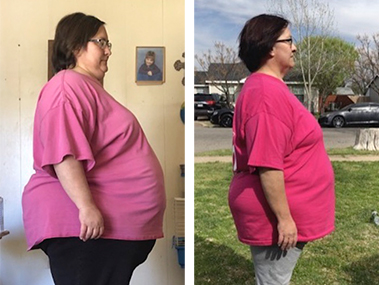At Panhandle Weight Loss Center in Amarillo, we offer comprehensive bariatric surgery and non-surgical weight loss treatment, along with dedicated support to help our patients achieve lasting success. If you suffer from obesity and have had difficulty maintaining weight loss through diet and exercise, the specialized medical treatment and compassionate care we provide can make your goal of a healthier and more fulfilling life a reality.
What is Bariatric Surgery?
Bariatric surgery is a safe and very effective treatment for obesity and can also reduce or even reverse many of the serious health conditions caused by obesity. Bariatric surgery involves changing a patient’s digestive system with the goal of reducing how much food he or she is able to eat (restrictive), reducing the absorption of calories (malabsorptive), or both.

Weight Loss Surgery Options
If you are a person who struggles with obesity, weight loss surgery may help you lose significant weight and dramatically improve your overall health. At Panhandle Weight Loss Center in Amarillo, our specialists will work closely with you and your support team to determine which bariatric surgery procedure and treatment plan will most effectively help you meet your goals.
Bariatric surgery options we offer include:
Gastric Sleeve

Gastric Sleeve surgery, also known as Vertical Sleeve Gastrectomy (VSG) or Gastric Sleeve Resection is a laparoscopic procedure during which roughly 80% of the patient’s stomach is removed. It is the most common bariatric surgery being performed for weight loss in the United States.
By reducing the size of the stomach, the patient is able to take in significantly less food (and thus, fewer calories). The Gastric Sleeve procedure reduces the body’s production of the hormone ghrelin, the hormone responsible for appetite.1
The average patient who undergoes Gastric Sleeve surgery loses 65% of excess weight within two years. Patients may also reduce or fully resolve Type 2 diabetes, high blood pressure, and sleep apnea, among other serious health conditions. The Gastric Sleeve procedure takes on average 45 minutes and is done laparoscopically. Most patients can go home the same day of surgery. The average return to work can be 1 week or less depending on the job you perform.
Duodenal Switch

Duodenal Switch bariatric surgery, formally known as Biliary Pancreatic Diversion (BPD) with Duodenal Switch, is especially well-suited to patients with a BMI (Body Mass Index) of 50 or more, need to lose over 100 pounds or more, have type II diabetes or have a low metabolism.
The Duodenal Switch surgery is the most effective weight loss surgery being offered today in the United States. It has two versions which is the Biliary Pancreatic Diversion with Duodenal Switch or a newer version referred to as Single Anastomosis Duodenal Switch (SADI/SIPS). The SADI version is a newer version and can result in 80-90% excess weight loss within two years of surgery. It also can have up to 90-95% resolution of type II diabetes. The SADI procedure is done laparoscopically and takes approximately 1-1.5 hours. It usually requires an overnight stay in the hospital. It involves reducing the stomach from the size of a football to the size of a banana just like the Gastric Sleeve procedure. It also involves bypassing approximately half of the small intestine.
Of all weight loss surgeries mentioned here, the Duodenal Switch procedure is the most effective for long-term weight loss as well as the resolution of diabetes and other health conditions associated with obesity.2
Gastric Bypass

Gastric Bypass surgery, also referred to as Roux-en-Y Gastric Bypass, is still a common surgery performed for weight loss.
This is a laparoscopic procedure with two components. First, the surgeon uses staples to create a small pouch in the upper part of the stomach. This greatly reduces the amount of food the patient can consume. Second, the patient’s small intestine is rerouted, allowing the body to absorb fewer calories. The bypass portion of this surgery also prompts changes in the patient’s gut hormones, suppressing hunger and leading the patient to feel full more quickly.3
In addition to an average excess weight loss of 75% over the first two years, patients who undergo Gastric Bypass surgery may also significantly reduce or even resolve Type 2 diabetes, high blood pressure, high cholesterol, sleep apnea, heartburn, osteoarthritis, and infertility.
Do I Qualify for Bariatric Surgery?
If you have struggled to achieve and maintain weight loss through diet, exercise, or non-surgical treatments, bariatric surgery may help you lose significant weight and reduce complications of obesity.
Strong candidates for weight loss surgery:
- Have a BMI of 30 or more
- Have been diagnosed with health issues associated with obesity, such as diabetes, sleep apnea, or heart disease
- Do not have uncontrolled psychological conditions
- Do not abuse drugs or alcohol4
In addition to these physical and medical factors for bariatric surgery candidacy, we at Panhandle Weight Loss Center require that you are absolutely committed to adhering to the weight loss plan created by your team. It is crucial that each patient fully understands that maintaining a healthy weight after weight loss surgery is not a guarantee. On the contrary, staying healthy and fit after bariatric surgery is a life-long journey that requires willpower, determination, and inner strength.

Are You a Candidate for Our Weight Loss Programs?
Take our 60 Second Assessment
Is Bariatric Surgery Safe?
Bariatric surgery is an incredibly effective weight loss tool, and is considered amongst the safest surgical procedures. Here are some facts about the safety of weight loss surgery:
- Multiple respected studies have found that the 30-day survival rate after bariatric surgery is higher than 99%5.
- Research increasingly points to bariatric surgery as the only reliable cure for obesity.6
- Bariatric surgery saves lives. Patients who undergo weight loss surgery are up to 40% less likely to die at five and ten years after surgery than patients who do not have bariatric surgery.7
Weight Loss Surgery Risks and Complications
While weight loss surgery has a very low risk profile, any surgical procedure carries the risk of complications. Risks associated with bariatric surgery include:
- Bleeding
- Infection
- Poor incisional healing
- Anesthesia problems
- Gastrointestinal leaks
Once surgery is completed, patients may be at risk for the following long-term complications of weight loss surgery:
- Malnutrition
- Vomiting
- Acid reflux
- Ulcers
- Hernias
- Low blood sugar
- Gallstones
- Dumping syndrome: causing diarrhea, lightheadedness, nausea, vomiting, and/or flushing
- The need for revision surgery8
Can I Afford Bariatric Surgery?
Perhaps a better question is: if you are overweight and suffer from obesity-related health conditions, can you afford not to undergo bariatric surgery? For many of our patients, bariatric surgery is a life-saving procedure that dramatically improves their health and happiness.
That said, we at Panhandle Weight Loss Center understand that the cost of bariatric surgery may be a concern. We offer competitive prices, and are committed to making sure that each of our patients is able to fit a healthier and happier life into their budgets. To learn about how we can help you maximize your health insurance benefits or to hear about the financing options we offer, please contact us.

Cost of Bariatric Surgery
The average cost of weight loss surgery in the United States is between $15,000 and $25,000, according to the National Institutes of Health. Because each patient has a unique treatment plan customized to best address his or her condition and goals, the best way to determine your actual weight loss surgery costs is to schedule a consultation with our team.9
Will Insurance Cover My Surgery?
For many of our patients, weight loss surgery is covered by medical insurance. However, some insurance policies may impose waiting periods or prerequisites before covering the cost of bariatric surgery or non-surgical weight loss treatment. For patients who prefer not to delay treatment, we offer a number of financing options.

Life After Bariatric Surgery
Weight loss surgery can help patients lose significant weight and also reduce or even eliminate health conditions associated with obesity—but it is not a “quick fix.” To successfully reclaim and maintain your health after bariatric surgery, you’ll need to be committed to necessary lifestyle changes including dietary restrictions and regular exercise.
Additionally, many of the habits and thought processes that contribute to obesity are developed over a lifetime and have deep emotional roots. For this reason, it’s important for weight loss surgery patients to work with a therapist and other members of his or her support team as they continue the journey of personal growth that will increase their odds of successfully maintaining a healthy weight.
Life after weight loss surgery can be a big change, but the adjustments you’ll make will be absolutely worthwhile. And we’ll be with you, every step of the way.
Eating and Diet After Weight Loss Surgery
As a member of the Panhandle Weight Loss Center family, you’ll work with a registered dietician who will help you understand how proper nutritional choices are essential to success after weight loss surgery.
The main facets of your healthy diet will include:
- Prioritize protein. You should consume 60g of lean protein every day, and maximizing your protein intake earlier in the day will help you feel fuller and more satisfied all day long.
- Eat balanced meals. Since you’ll be eating smaller portions after bariatric surgery, you’ll need to make sure every bite helps you meet your nutritional needs.
- Make mealtime distinct. Eat at the table, not at the couch or in front of the TV. Take at least 30 minutes to enjoy each meal.
- Watch your portions. After weight loss surgery, smaller portions are key to healthy digestion. Learn to chew slowly and enjoy your food, and learn to stop eating when you feel full.
- Hydrate. Sometimes, people think they feel hungry when they are actually thirsty. Drink 48-64 ounces of water every day.
- Eat whole foods. Stay away from boxed, processed foods and put your focus on lean protein and fresh fruits and vegetables.
Bariatric Surgery Success Stories
If you struggle with obesity and maintaining a healthy lifestyle, it can sometimes feel like you’re “in it alone,” and that other people don’t understand your challenges. At Panhandle Weight Loss Center, we have helped many patients just like you successfully lose weight, keep it off, and enjoy a happier and healthier life. We hope that exploring testimonials from some of our patients will be encouraging to you.
Explore Your Weight Loss Surgery Options
To learn more about the bariatric surgery and non-surgical weight loss options we offer at Panhandle Weight Loss Center in Amarillo, we invite you to contact us today. We will be honored to serve as a resource for you and support you throughout your weight loss journey.
1 American Society for Metabolic and Bariatric Surgery. Sleeve gastrectomy. Available: https://asmbs.org/patients/bariatric-surgery-procedures#sleeve. Accessed May 26, 2020.
2 American Society for Metabolic and Bariatric Surgery. BPD. Available: https://asmbs.org/patients/bariatric-surgery-procedures#bpd. Accessed May 26, 2020.
3 American Society for Metabolic and Bariatric Surgery. Gastric bypass. Available: https://asmbs.org/patients/bariatric-surgery-procedures#bypass. Accessed May 26, 2020.
4 National Institute of Diabetes and Digestive and Kidney Diseases Health Information Center. Bariatric surgery candidates. Available: https://www.niddk.nih.gov/health-information/weight-management/bariatric-surgery/potential-candidates. Accessed May 26, 2020.
5 Pories WJ. Bariatric surgery: risks and rewards. J Clin Endocrinol Metab. 2008;93(11 Suppl 1):S89‐S96. doi:10.1210/jc.2008-1641. Accessed May 26, 2020.
6 Suter M, Calmes JM, Paroz A, Romy S, Giusti V. Results of Roux-en-Y gastric bypass in morbidly obese vs superobese patients: similar body weight loss, correction of comorbidities, and improvement of quality of life. Arch Surg. 2009;144(4):312‐318. doi:10.1001/archsurg.2009.19. Accessed May 26, 2020.
7 Arterburn DE, Olsen MK, Smith VA, et al. Association between bariatric surgery and long-term survival. JAMA. 2015;313(1):62‐70. doi:10.1001/jama.2014.16968. Accessed May 26, 2020.
8 Mayo Clinic. Bariatric surgery. Available: https://www.mayoclinic.org/tests-procedures/bariatric-surgery/about/pac-20394258. Accessed May 26, 2020.
9 National Institute of Diabetes and Digestive and Kidney Diseases Health Information Center. Bariatric surgery. Available: https://www.niddk.nih.gov/health-information/weight-management/bariatric-surgery/definition-facts. Accessed May 27, 2020.
The surgeons at Panhandle Weight Loss Center have either authored or reviewed and approved this content. Page Updated:
